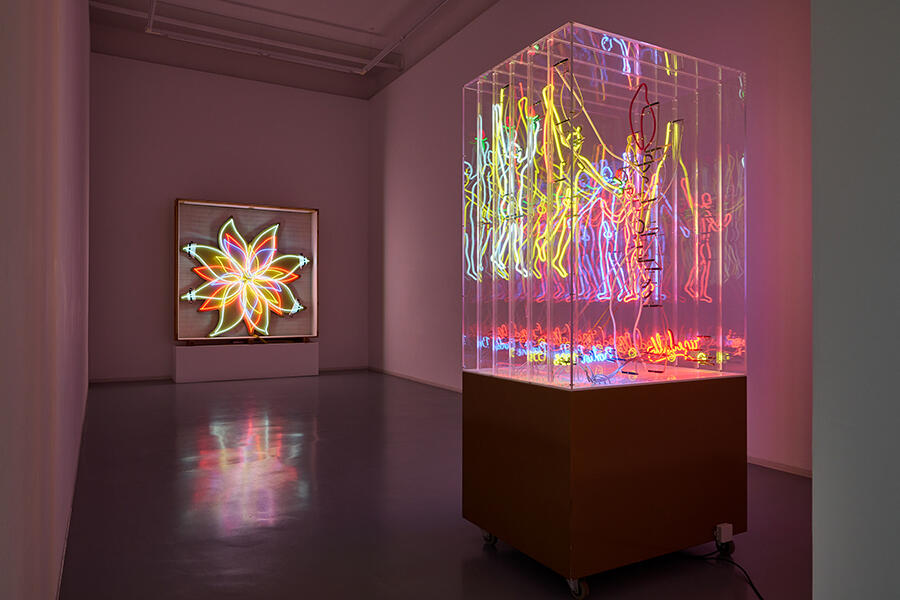David Medalla’s Celebration of the Ephemeral
At Bonner Kunstverein, the late Filipino artist’s first European retrospective is a poetic tribute to an oeuvre that refuses to be categorized
At Bonner Kunstverein, the late Filipino artist’s first European retrospective is a poetic tribute to an oeuvre that refuses to be categorized

At the entrance to ‘Parables of Friendship’ – Bonner Kunstverein’s two-part survey of the late Filipino artist David Medalla – visitors are confronted by a long partition wall and a wooden staircase, which invites the visitors to climb up, then almost immediately descend to the other side, without a clear purpose. The wall is inset with a small aperture, on the ledge of which sits a little model boat: its sails depict two figures hugging; shells hang from its jib (Title Unknown, 2017). Offering a glimpse of the exhibition ahead, this window acts as an invitation to explore the first European retrospective of this exceptional artist, who sadly passed away last year, during preparations for the show, at the age of 78. Bringing together more than 70 works – ranging from his ‘Night Blooming Flower’ series (1998) of neon sculptures to drawings on used paper bags and envelopes, such as Study for Li Po dancing with the moon (1983) – the exhibition successfully navigates the turbulent waters of surveying an expansive yet widely overlooked oeuvre that inherently refuses categorization.

Born in the Philippines in 1942, Medalla spent most of his life overseas. In the 1960s, he moved from Manila to Europe, dividing his time between London and Paris, crossing the Channel whenever his visa expired. In Paris, the queer and non-conforming artist retraced the steps of his idol, the symbolist poet Arthur Rimbaud. Two works in ‘Parables of Friendship’ reflect this fascination: a drawing of an imagined Skull of Rimbaud (1962) and The Death of the Poet Arthur Rimbaud (1969), a painting of two figures supporting the trembling writer. In 1964, Medalla co-founded the short-lived yet influential Signals Gallery in London, a hub for the international avant-garde in the mid-1960s, whose roster included artists such as Lygia Clark, Hélio Oiticica and Takis. During this period, Medalla also built his first Cloud Canyons (1964–2020): the biokinetic bubble machines that are arguably his best-known works.

In addition to the entrance staircase, Michael Kleine’s impressive exhibition design divides the large hall of Bonner Kunstverein into sections, inspired by shipping containers, enabling co-curators Steven Cairns and Fatima Hellberg to form small constellations of thematically grouped works. Above the row of containers, four massive canvases from Medalla’s ‘Luz. Vi. Minda’ series (1986–91) are suspended in mid-air. Portraying tropical landscapes in which elegant young men fish or tend to banana trees, the paintings play on nostalgia and the Western gaze. The container below hosts some of Medalla’s text-based political works from the 1970s, in which he condemns the politics of Ferdinand Marcos, the kleptocrat president of the Philippines who ruled the country under martial law from 1972 until ’81, silencing and imprisoning opposition groups, protesting students and journalists. One of Medalla’s untitled and undated works on cardboard, for instance, reads: ‘Marcos and his handful of hoodlums will meet their doom in the hands of the Filipino people!’

On an elevated podium, A Stitch in Time (1981–82) comprises a large piece of nylon fabric onto which are sewn various names, doodles, candy wrappers and passport photographs; in places, cigarette burn marks are visible. The work is one iteration of the eponymous participatory piece that Medalla began developing in London in 1968, when he gave two of his former lovers a handkerchief and a small sewing kit then instructed them to stitch onto the cloth whatever they liked. A shared work of labour, memories and dreams, A Stitch in Time was described by the artist as a project of ‘participation-production-propulsion’. This type of encounter was central to the practice of Medalla, an artist who celebrated the ephemeral and rejected hierarchal perspectives of any kind.
David Medalla, ‘Parables of Friendship’ is on view at Bonner Kunstverein until 29 January 2022. It will travel to Museion, Bolzano, where it will be shown from 2 April – 14 September 2022.
Main image: David Medalla, Untitled, 2017, installation view, Bonner Kunstverein, 2021. Courtesy: Bonner Kunstverein; photograph: Mareike Tocha. Thumb: David Medalla, ‘Luz. Vi. Minda’ series, 1986, oil on canvas. Courtesy: Bonner Kunstverein; photograph: Mareike Tocha




















